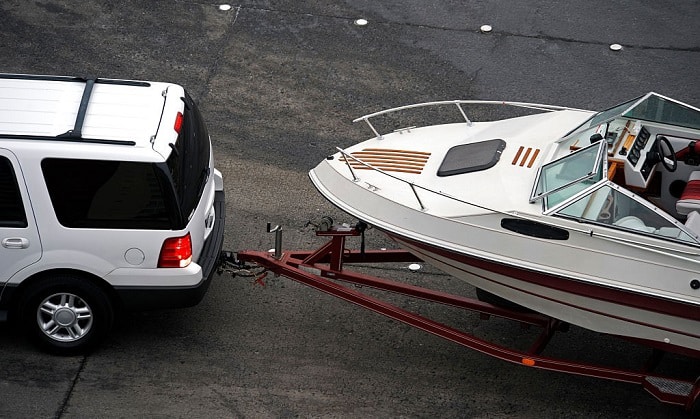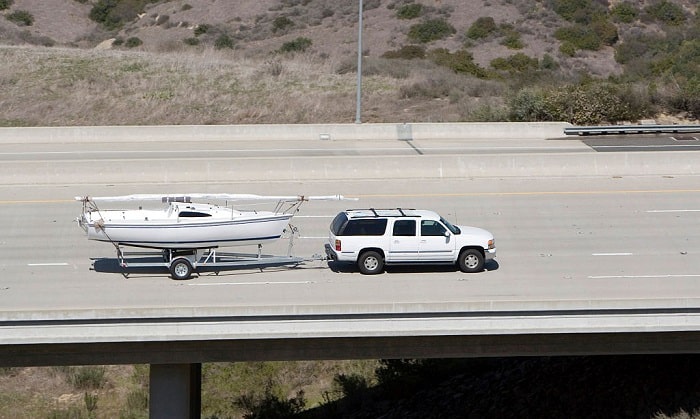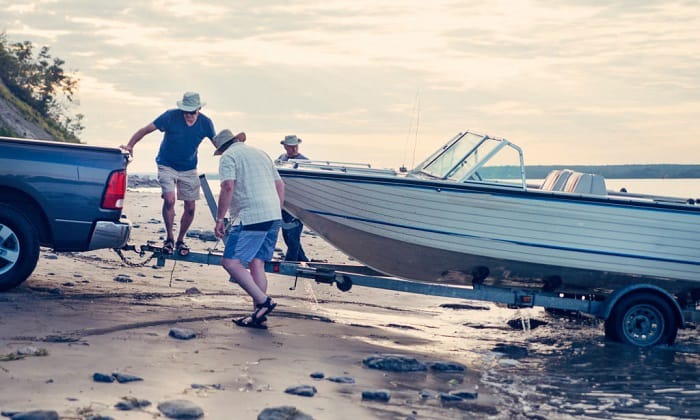It’s easy to think that when taking the boat out to the water with a trailer, all you need to worry about is launching and retrieving. Unfortunately, boat life is not so simple. There are many things we need to know how to manage, including securing the boat on the trailer, which means managing tongue weight.
In order to address this, it helps to know boat trailers with too little tongue weight tend to do what. We’ll go over tongue weight and its impact on the boat trailer. Stick around and keep reading to learn more.
Table of Contents
What Is Tongue Weight
Tongue weight refers to the downward force of the trailer’s tongue against the hitch of your towing vehicle. This force can be measured using standard measurement units for weight such as pounds (lbs) or kilograms (kg). The ideal tongue weight is around 10 to 15 percent of your trailer’s gross weight.
If you have a trailer with a gross weight of 5000 lbs, then a tongue weight of around 500 lbs, which is 10 percent of the gross weight, should be an acceptable figure. The gross weight should include not just the boat and the trailer, but also everything you expect to load onto the boat while you transport it using the boat trailer.
Too Little or Too Much Tongue Weight
What happens when tongue weight is outside of the ideal range? Boat trailers with too little tongue tend to do what? What about having too much?
When there is too little tongue weight, the trailer becomes unstable because there is not enough downforce on the hitch. The result is a trailer that is prone to swaying, which makes it dangerous for you and for other vehicles.
When there is too much tongue weight, the towing vehicle’s front may end up slightly raised, resulting in less traction. This in turn results in less braking and control. The trailer’s rear wheels may also be impacted.
Managing Tongue Weight
Boat trailer tongue weight is directly affected by weight distribution on the boat. When most of the weight is located at the rear end of the boat, it results in too little tongue weight. Having more weight at the front results in too much tongue weight.
The effective way to manage tongue weight is to properly distribute the weight on a boat. By changing the placement of items and supplies aboard the boat, we can adjust the tongue weight and have the boat’s tongue weight closer to the ideal range.
Difficulties in Tongue Weight Management
One of the big challenges in managing tongue weight comes with boats that use outboard motors, as the placement of the engine at the stern creates a shift in weight distribution that is difficult to counterbalance.
It is also worth noting that while the range of 10 to 15% of gross weight is the ideal tongue weight, limitations in boat placement on the trailer may also contribute to the difficulty of acquiring the desired tongue weight. While the 10 to 15% figure is ideal, it is normal to be unable to hit the mark perfectly, and just keeping the number close is usually good enough.
How to Measure Tongue Weight
Measuring the tongue weight of your boat trailer is simple and straightforward. Before measuring tongue weight, however, make sure that you load up everything you expect to have on the boat when transporting it.
1. Simple way
The simplest way to measure tongue weight is by using a commercial truck scale. First, weigh the towing vehicle with the trailer attached and note the resulting weight. Make sure to keep the wheels of the trailer off the truck scale.
Next, disconnect the trailer from the vehicle then weigh the vehicle again. Subtract the resulting weight from the weight of the towing vehicle with the trailer connected. The difference is the trailer’s current tongue weight.
2. Home method
We can also measure the tongue weight of the boat trailer using a standard bathroom scale. First, measure the height at which the trailer’s tongue rests on the vehicle’s hitch. Place the scale at the same height using wooden blocks or pieces; just make sure that they are sturdy enough to support the weight.
Raise the trailer using a jack, then lower the trailer’s coupler onto the scale. The weight reading on the scale will be the current tongue weight of the trailer. However, most bathroom scales will not go over 300, and few scales reach 350 lbs. For heavier loads, we’ll need a more specialized measurement process.
Measuring Heavier Boat Trailers
We can still measure heavier trailers using a standard bathroom scale, but we’ll need to use a special setup for it.
What you’ll need:
- Bathroom scale
- Brick, block, or stone slab
- Wooden beam, around 3.5 feet long
- An extra wooden beam or wooden block
- 2 pipes
- Yardstick or measuring tool
- Jack
- Saw
Steps to Measure Heavier Tongue Weight
- Step 1: Chock the trailer wheels.
- Step 2: Place the brick slab under the trailer tongue (about 1 ft), then place the bathroom scale on the opposite side of the trailer tongue. There should be around 3 feet of distance between the slab and the scale and their surfaces should align.
- Step 3: Place the piece of wood horizontally underneath the tongue with one end over the slab and the other end over the bathroom scale.
- Step 4: Place one pipe horizontally between the wooden beam and the scale, and the other pipe between the beam and the brick. Both pipes should be placed crosswise to the beam.
- Step 5: Mark the 1-foot position on the wooden beam from the pipe on the slab. Place the extra piece of wood vertically there and mark the height where the trailer tongue should rest on the tow vehicle’s hitch. Cut off the extra length of the wood with a saw.
- Step 6: After cutting the excess length of wood, place the extra piece of wood vertically on the beam once more. Place it on the beam at the 1-foot mark from the pipe on the slab. Lower the coupler of the trailer’s tongue onto the vertical piece of wood and read the resulting weight on the scale.
- Step 7: Multiply the resulting weight by three, and this is the current tongue weight of your boat trailer.
- Step 8: For even heavier trailers, use a longer beam at around 4 feet long and have four feet of distance between the scale and the slab instead of three.
Boat Towing Tips
1. Know the GVWR for your vehicle
The gross vehicle weight rating is the weight capacity that a vehicle is designed for. By subtracting the gross weight of a vehicle from the GVWR, you can find the carrying capacity of your vehicle. The GVWR is usually found on the driver’s side door.
A 5000 lbs vehicle with a GVWR of 7500 will have a carrying capacity of 2500. However, this carrying capacity includes not just the tongue weight of the trailer it will be towing, but the passengers of the vehicle as well. Always bear this in mind.
Exceeding the carrying capacity of your towing vehicle can result in damage to the vehicle and can even cause accidents, so pay close attention to it. Trailer hitches also have a gross weight capacity that you should look out for.
2. Check the boat for water before towing
It’s a good idea to always check the boat for water before proceeding to tow it. Water in the boat results in extra weight, which can disrupt the weight balance you work so hard to achieve on the boat trailer. Be especially careful after retrieving the boat from the water by raising the outboard and draining the water properly.
Conclusion
There are a lot of things to learn in order to make boating a safe activity. After reading this article, you now have a better understanding of how tongue weight affects your boat towing, including boat trailers with too little tongue weight tend to do what.
Don’t hesitate to share this article with others so that we can help them be safer on their way to a boating day. Leave your comments below as we’d always love to hear from you.
Remember to boat safely.

“My intention from the first day establishing Boating Basics Online is to provide as much help as possible for boaters who want to experience a first safe and convenient trip. So feel free to join us and share your beautiful journeys to the sea!”



